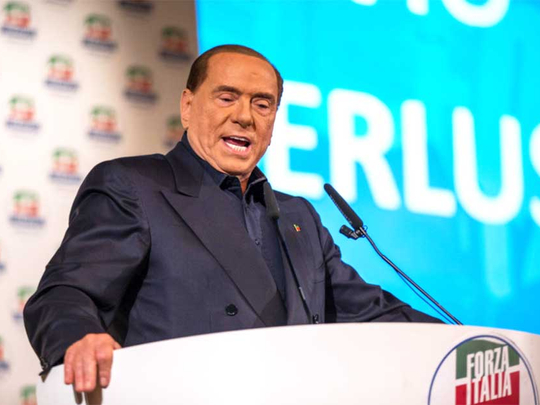
Pity poor Matteo Renzi. Up to a few years ago, the Italian premier was considered to be one of the freshest faces in European politics, an engaging leader who seemed ready and willing to break the mould of Italian politics.
Now, with Italians about to vote in elections on Sunday for a new Chamber of Deputies and a Senate of the Republic, his Democratic Party (PD) seems in free fall. Barely four years ago, Renzi led his party to a historic win in the 2013 general election, making the then 39-year old the youngest leader in Italy’s history since Fascist dictator Benito Mussolini took the reins in October 1922. And in European Parliament elections in the spring of 2014, Renzi’s popularity gave the PD 40.8 per cent support.
His fall is all the more surprising, given that Forza Italia’s Silvio Berlusconi now seems ready to have his centre-right allies form the next government. Berlusconi, 81, is barred from holding office over his fraud and tax convictions. Berlusconi, who controls a media empire, remains popular with older voters who rely on his newspapers and television channels for their political news.
Surprisingly, many Italians still prefer traditional news-delivery methods and only 60 per cent there cite the internet as their main source of news.
“Renzi is down at 20-point something,” boasted Berlusconi at a rally in Rome last week. “He has zero chance of winning more votes for his party, which is a train everybody is jumping out of.”
Italian politics, however, remains extremely fickle, and there were 62 separate Italian governments in under seven decades after the end of the Second World War.
It was Berlusconi, however, who managed to be the first Prime Minister to lead a full five-year term government of Italy, between 2008 and 2013, That was an administration convulsed, however, by investigations into Berlusconi’s tax and business deals, allegations of sexual misconduct — and a growing national debt ratio that today gives Italy the second-highest debt-to GDP ratio in the European Union and the 19-member Eurozone.
For many, Berlusconi, with his dyed and oiled hair, permanent tan and carefully managed image, appears more like a benevolent godfather or “nonno” — a grandfather.
For all of the mess left by Berlusconi, however, Renzi was determined to make good. Once in power, he liberalised the labour market, legalised same-sex marriage and oversaw a tenuous but gradual economic recovery.
But his biggest project was a series of constitutional reforms that would have given him more power to act and reform Italy’s complex legal and labour laws that stifle competition.
Under the Italian constitution, a Prime Minister must have a majorities in the 630-seat Chamber of Deputies and the 315-seat Senate of the Republic. And when Renzi’s amendments were put to the Italian electorate in a referendum in December 2016, it firmly rejected them, forcing his resignation.
But Renzi had also alienated the left-wing of his PD, leading to a split and a loss of support in marginal seats heading into Sunday’s election. Mass migration over the Mediterranean Sea route too and a crisis in confidence in Italy’s banking systems hasn’t helped either.
But Renzi remains unrepentant. “The things we have done are more than our mistakes,” he too said in Rome last week. That may be true, but many Italian voters still aren’t buying into his vision to stimulate the economy, offer tax breaks for businesses and try and negotiate a grace period with the EU from the terms of the Fiscal Pact.
That pact commits governments to spending powers and limits their ability to engage in deficit financing.
And Renzi still believes in the reforms that were rejected by voters 15 months ago. “I think it was crucial to give a jolt to my country,” he says. “I’d be ready to repeat the referendum battle tomorrow morning, because the referendum would have objectively allowed Italy to become a simpler country.”
While analysts predict Sunday’s vote will result in a hung parliament, it is Berlusconi who may very well be in a position to cobble together enough votes from Forza Italia, the Northern League and the Brothers of Italy to form a centre-right coalition.
Renzi, however, believes his party offers the best chance of offering a realistic and competent choice for voters against Berlusconi’s alliance and the populists Five Star Movement.
“We have a precise, almost boring list of objectives for the future,” he said.
But Italians don’t do boring.
The parties on the right want to introduce a second currency for Italy, offer minimum incomes of at least €780 (Dh3,500) monthly, and want to clamp down or send back refugees who have flooded into Italy across the Mediterranean route. Berlusconi is even offering tax breaks for pet owners.
Five Star want a referendum on euro membership if partners refuse any concessions on the Fiscal Pact; they want to cut privileges of politicians, trade unions and well-off pensioners, cut red tape and scrap public financing of newspapers.
For Renzi, the promises of the left and right are too much.
Some people may be more likeable than me, some may be less likeable,” he shrugs. “But when my kid goes to school, I don’t ask myself if the bus driver can tell a good joke: I ask myself if he can drive. And I think Italy needs to be driven forward.”
Come late Sunday evening, when all of the votes are counted, it remains to be seen who will be having the last laugh.









